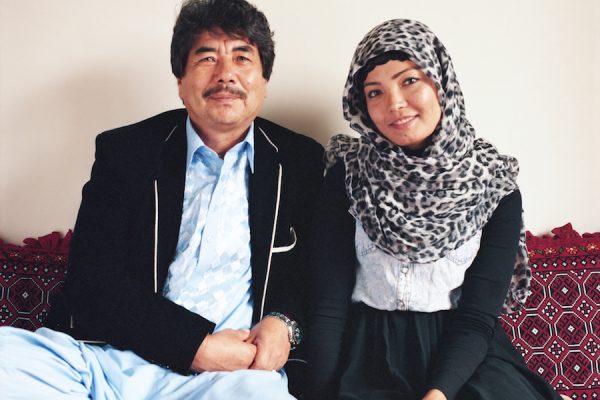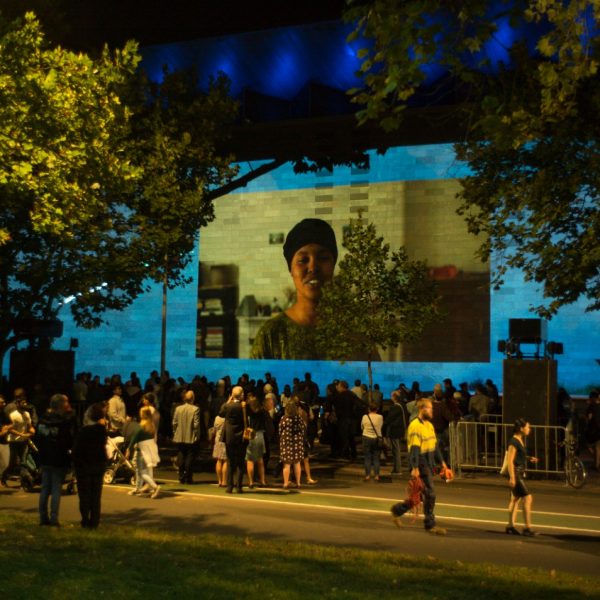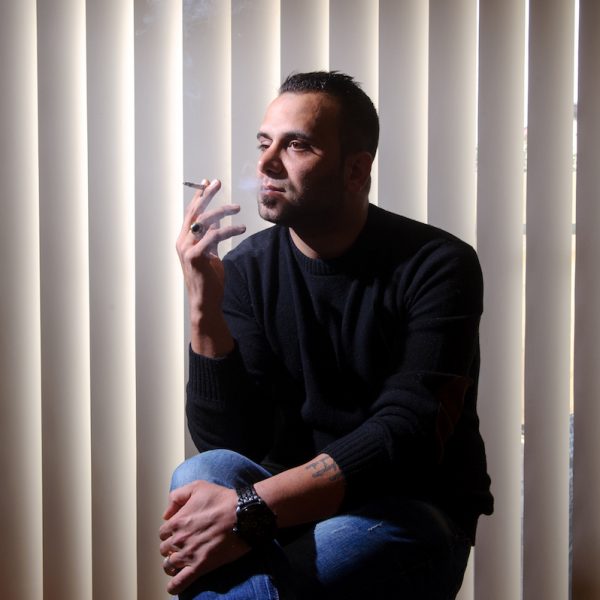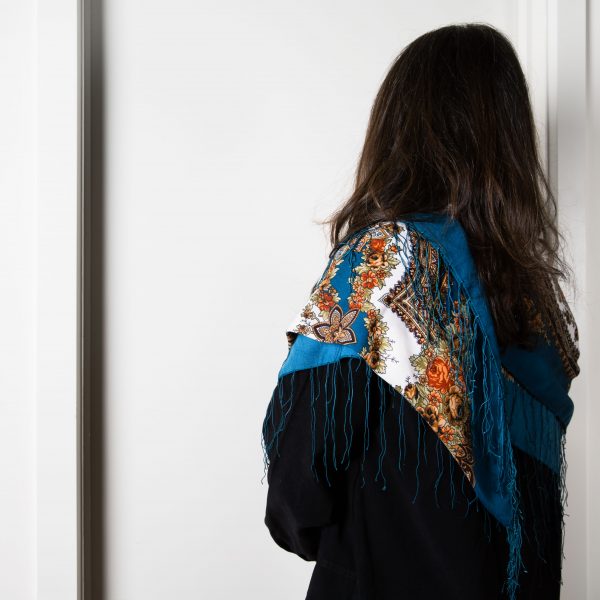
Ali Haidary and his eldest daughter Rahila are sitting on a bright red Afghan carpet in the family’s house in Shepparton. Rahila is interpreting for her father, and interjecting…
I JUST WANTED TO LEARN
Ali: When my daughter was born, I didn’t see the difference between a boy and a girl. So I didn’t care whatever clothes she would wear when she was a child. We didn’t actually teach her that you are a girl. But when the Taliban came, I heard that they were against these things, that they were against education for girls, particularly. But by that time I think my daughter didn’t understand that she shouldn’t go to school because she’s a girl, so she dressed up in boys’ clothes then just went to school.
Rahila: I was a bit cheeky, I would say, and naughty maybe [laughs]. I was really confident and had that self-esteem. I really didn’t like that my cousins would get to dress up, leave home and go to the Madrasa, the religious class, but I couldn’t go. I had to stay home alone and there would be no one to play with. Sometimes I’d put on my cousin’s clothes just for fun, but this time it wasn’t for fun – I just wanted to experience being a boy and going to Madrasa. Dad didn’t know. I think I just wanted to learn.
There was the teacher and all the boys sitting around the room and they were just reading the books, and I sat close to my cousins. They’re like: “Why did you come? Why did you come?” There were people whispering around and laughing, and the next minute the teacher realised there is a girl in the classroom. Okay. All that yelling and anger. The teacher said to me: “Go home. You’re not supposed to be here.” I think someone else might have seen, like the Pashtuns, the members of Taliban. They considered me as a grown up girl, at the age of six. I didn’t understand the consequences.
Ali: The people that were sent from the Taliban just came to me while I was watering the plants and they warned me that if…if she does it again we’re going to kill her, she has to leave. I was sure that if my daughter stays here she would do something else. I always wanted my daughter to be educated and to go to school, but I had never thought that they… they would be so cruel. I was… Inside, I was still proud of my daughter. It was just the situation that I couldn’t handle.
Rahila: I know that night was really hard for my family, particularly my mum. She wouldn’t cry, but I know that she didn’t sleep the whole night. I could hear her, uh, like, I had that feeling that she was hurt.
The day I had to leave, first thing in the morning I just woke up before everyone else. There was this favourite place of mine at the riverside, I could feel the sun rise there. I had built a really tiny sort of house, with the branches of the tree and I would just go there and sit and watch the river. But that morning I couldn’t see a lot because it was still dark. I just went there and I knew that I won’t be able to feel this river tomorrow. You know the… waves, the water, that sound, I just loved that. I still love it. If I have a preference to go to a place, I’m like: “Is there a river somewhere or a waterfall I could see?”
And then… then I couldn’t actually stay there for long. I could hear my dad, he was calling, “Where is Rahila?” The car was already there and I had to leave.
I could hear my dad calling, “Where is Rahila?” The car was there and I had to leave. Share on XSHASHBORJA MEANS SIX TURRETS
Ali: What would you like to know about? I am 46. The place that we lived…the village is called Shashborja.
Rahila: Shashborja means six turrets. It’s in the middle, between the Hazaras and the Pashtuns. And, I will describe it: it’s so beautiful, there’s a really big river that comes across, and then every year it snows, everywhere looks white as if it’s a wedding [laughs], and then in the springtime, it’s just so colourful with different flowers. The sunlight, it’s so special, you can’t feel that in any other country you go to. I just desired that so much, I haven’t felt it in Australia.
It’s not all mud and it’s not how they show it on television with a lot of armed people. It is like that, but not always. For me, it was just a really beautiful place and we had orchards, we had apples, almonds, and then different vegetables, beans, potatoes, cucumber. Our house was big, it was two storeys: the first where we kept all the sheep and goats and then the next level there was bedrooms. In Afghanistan they don’t have a lot of bedrooms. They would just have one for the guests and then one or two bedrooms where all the family, they sleep together at night.
Ali: My dad didn’t force a lot of work on me, I just grew up as a really fortunate child. I would normally do farming. We would grow all the vegetables, everything that we needed, and we had a shepherd who would come and take the sheep and the goats in the morning. Growing wheat was our main income. We didn’t need lots of money to survive.
It was hard for me to accept being persecuted because we’re from a minority, and a different religion, and I just struggled with that. For me the good times were before the revolution. Daoud Khan, who was the president [from 1973 to 1978], he was killed, and then Nur Muhammad became the president and that’s when all the war started and I became a refugee. I was 16 when I left for Iran… I lived there for seven years. It was still hard for me, I experienced a lot of racism, we couldn’t go outside, we were not actually free, but still, it was better than losing my life in Afghanistan.
After seven years I went back to Afghanistan and got married. After two years I heard that a group called Taliban is coming from Pakistan. First, because we didn’t know anything about this group, we just hoped they would come and bring peace and make it a equal society but as they got closer we started seeing them torture Hazaras. The torture got worse. They would just do horrible things just to show us that they had the power, we were the minorities. My hair was long, so with the knife they shaved one side of my head, and that happened to my brother-in-law as well. They wanted us to have long beards and they came and beat us and said, “Why is your beard shaved?”
Even though I took Rahila to Pakistan and left her there, the Taliban were still angry. One day they kidnapped me and then took me to a mountain. They had two dogs tied up and they kept me so that the dogs were just this close but they couldn’t reach me, the deadly dogs. They would just kill you. They kept me there for six or seven nights and released me because my uncle, he was a well-known guy, he paid maybe $3000 Australian dollars.
THE GRANDPA STOP
Rahila: In Pakistan I lived [in Quetta] with my grandma and aunty. I was coming from a place where the mountains were so beautiful you couldn’t even stop looking at them, but in Quetta you could hardly see any trees or grass and there was rubbish everywhere. But the most exciting part was when my dad took me to the school. There was a crazy amount of noise coming from those classes but I could see a blackboard, a teacher standing there and the students sitting on the chairs… It was just one of those images you have in mind and then you truly see it. Once I was enrolled in the school that meant everything for me.
My favourite place, where old men gathered, it was on the way back from school – it’s called bakol stop, and it means “the stop of granddads”. It was a bus stop, but it was under a shed and it was big. They would just all sit and have tea and chat, and they would all be laughing. Whenever I came from school I would walk past them and watch them. Sometimes my grandpa was there as well, so I would go there and say hi to grandpa and then go home.
And one day when I had recently gone to Pakistan, when I came there, a guy who was not Hazara had brought a dancing snake and he was playing and the snake was dancing. Then there was a shot, and I looked on the corner, and there was a man [covered] in blood. I could see that man calling me for help, his face is full of blood… but I was numbed. I… I couldn’t even yell, for a few moments I couldn’t even move my feet. And then I screamed really loud and I think I must have fallen down. I can’t remember everything but… that guy, the one with the snake, he ran away. They had planned it. That was the first time I had seen a Hazara being targeted on the street.
The Grandpa stop is still there, in Quetta, but I don’t think many people go there now. But at that time it was really popular.
HE WAS STRANGLING THE CAT
Ali: I couldn’t live in Afghanistan any more. I thought I would live in Pakistan and see what happens, see if I could return sometime. When I left with my family, I remember that for two days we were held in Uruzgan, in the Taliban area – this is one of the worst memories that I have from Afghanistan. There was this Saudi Arabian guy, he had a cat in his hand and he was strangling that cat, like pushing really hard on its throat and then he would just release and go again and then he would say to the cat, “Oh you Hazara, where are you going? Wherever in the world you go we will be looking and you will get killed at the end.”
I just felt so helpless, and just so weak, in my own country, in my own lands, I was feeling like I’m not even a human. I was just under so much pressure mentally, so at that stage we only had to leave, that was all.
Rahila: This was after I was taken to Pakistan, then my family escaped and came to Pakistan as well, it was just 2002.
Ali: We lived in Pakistan for two years, I went to Iran, then returned to Pakistan. And then we had to go back to Afghanistan, because Taliban said that they no longer care about Hazaras. We just thought maybe it’s peaceful now. But my daughter was still in Pakistan. I left her to get education.
When the different militaries came to Afghanistan from America or Australia, they would bring tanks of petrol and we would help transfer them over to the Uruzgan, and then Taliban actually thought that I was helping them against Taliban. I think that’s why they were so against me then. In 2008 they killed my brother, Zaurshah. We had to leave Afghanistan again, because nothing was right.
All my life, I haven’t… I haven’t really had good times, and all my life I had to escape, I couldn’t go back home, I had to go through a lot of torture, I don’t know how I tolerated that all, but now I’m taking six tablets every day, just to… to be still awake, just to feel alright, but still, I can’t escape… I can’t just forget everything.
THE WAY TO AUSTRALIA
Ali: I went to Kabul, while I was sitting in a restaurant someone said, “The way to go to Australia has opened”. I asked, “What do you mean? How is it open?” and they said,
“The new president accepts refugees, there is better policy”. So I talked to this guy to make me a passport. I went to Quetta and departed from Quetta for Malaysia. I just saw my wife… she was worried about where I was and what I am doing. I told her that I am going somewhere tonight, but I didn’t actually tell her that I was going to go through smugglers or anything like that, or nothing about going to a different country. I just said, “I will be late tonight”.
Rahila: It was night time, so everyone else was sleeping, so only Mum knew that… only Mum had seen Dad.
Ali: The only thing that I could feel was that I wanted my family to be safe, so I… I just decided that either I die, or I can save my family. About 90 per cent I was scared, I had fear that I might lose my life. Giving a lot of money to people and then going to Malaysia and then to Indonesia, it was all illegal, and I just felt the fear. But I think I had accepted that fear and death in order to take my family to a safe place. I was on the sea for 23 nights. The boat was broken. It was the same size as this master bedroom, not even this big.
The last night we were on the sea, when the waves would catch us, I would go underneath the water and I would just think that I’m sinking… I’m dying… this is the end. But then the boat would go up again because there were just too many big waves that would come and go. And I was just hanging onto the wood of the boat, outside that room.
It was getting light in the morning when we saw a navy boat coming, it had the Australian flag on it. They didn’t come closer than 200 metres distance from us, we were all yelling for help because we were nearly sinking, we were trying to get the water out of the boat and still yelling for help, but they were not coming closer after a few hours… and then they went away. We couldn’t see them any more. But then they came back to rescue us. They gave us food and drink. We asked them why they didn’t help in the first place, but they said it was because it was early in the morning and they were waiting for confirmation from Australia and no one was answering the calls.
When the Australian navy caught us and they were really nice to us, that’s when I realised, yes, the Australian people are really nice. When we got off the navy boat at Christmas Island, there were Land Cruisers that took us and on the way there were Australian people standing and they were yelling, “Welcome, welcome!” and they were all cheering and then when we got to the hall, everything was prepared, like, good food and drinks on the tables, because maybe they thought we were hungry.
There were Australian people standing and they were yelling, “Welcome, welcome!” Share on XAfter we ate they took us to a place where there were big metal gates. They took us inside. It was a feeling that you are going into a prison. It was the detention centre. The doors would just open with swipe cards, which was something really new to us. There were many doors that would close and close and close and we’re just inside them… This was 2009, at the start of the year, I think we were the fourth boat that arrived in Australia. After us it just all changed. There were more refugees arriving, they were getting more cruel to them.
For about a week they did not open any doors for us, and then they would let us go out for an hour and walk on the grass and then come back inside. We thought to ourselves that they might even send us back, because no-one knows that we’re here. But then again, we were just glad that we had overcome the sea.
IT’S A SHAKY VOICE
Ali: The first night when they brought all the phones and said to call your families, no one called, because we were thinking they’re going to record our voice, and would not let us stay in Australia. But then in the second week, I called my family. Still some people wouldn’t call, but I just couldn’t wait. I couldn’t remember the phone number, so I called one of my friends and told him to tell my family that I’m in Christmas Island.
Rahila: Oh… so… before he called, that friend of his, one day he came and said, “A boat sank in the sea on the way to Australia and I assume that your dad was on that boat”. I remember my mum breaking down at that moment. And like… you can’t tolerate… you can’t just… and then, after few days that man came again and said: “Your dad has called me and he’s in Christmas Island”. But by then we were thinking that, oh this man must be crazy, but anyway we gave him the number for a mobile we had in the house. And then one day it was ringing and I picked up the phone and it’s a shaky voice and I couldn’t recognise my dad’s voice at the start. But then he was calling me his daughter – “bachay” in Hazaragi – and… I keep saying, “How are you Dad? How are you Dad?”
I didn’t know what Christmas Island was. But I had a map of the world on my wall. It was actually on the map. And then the next minute I was just going crazy I was yelling and I was shouting around the house and mum was just like: “What happened to you?” And I was like: “Mum, dad called us and he’s safe. He’s in Christmas Island.” And I can’t forget my mum’s face, glowing. Her eyes… I think she needed that. Her whole body needed that, needed that Dad was safe. And that small smile on her face was just so beautiful.
I didn’t know what Christmas Island was. But I had a map of the world on my wall. Share on XAli: I was on Christmas Island four months. Once I had contacted them I would call every night. I guess it was all the excitement and exciting future that we would talk about. I would just count the days and then tell my family that, “Oh, my friends are getting released, I might get released soon, and I’m safe now”, and just talk about how life would be in Australia. My family was happy as well and they liked hearing about Australia and all the exciting things that happen in Australia.
I think the hardest days were towards the end, because everyone else was getting released and they were getting their visa, but I was still in detention centre. I was thinking that maybe they wouldn’t accept my application.
ALL THE PRIDE AND ALL THE HAPPINESS
Ali: When I got released from detention centre, I got a friend’s details, and then he came to Melbourne and brought me to Shepparton. After three months I lodged the application for my family to come over. I think the government have been kind to me, apart from being in the detention centre. It’s hard to see that people like me, in similar situations, come to Australia and get treated differently to to the way I was treated. I know that it’s not fair… If that had happened to me, I wouldn’t be strong enough to deal with it.
Rahila: Dad was released from detention centre on the 25th of May, 2009. I think that if my dad was kept in the detention centre he wouldn’t have survived for a long time. Dad can’t deal with being far from his family. He has an extraordinary feeling for his family and his country. I think he’s really struggling to forget his past.
We came to Australia on the 27th of March 2011. I’m 21, I’m still young. I was 16 when I came to Australia. I had English as one of my subjects in Pakistan, but it was really limited. When I arrived in Shepparton I went straight into year 10. I just wanted to fast track. I remember doing science and I’d basically sit there and stare. Sometimes when I would ask questions in the class everyone would laugh. Sometimes I would laugh with them because it was too funny – I couldn’t even understand what I was saying.
When I was in year 12 I did a diploma of interpreting at the same time, which is like double full-time work. How silly! Why would you do it? But afterwards you’re just proud. You’re like… Yes, I believe I can do it. There’s nothing that is impossible for me.
I think it was just that determination that “I want education”, and when you get the opportunity you want a lot of it, you want to get everything all at once.
When I got into university, oh my god, I can’t even describe my feelings! I’m doing a double major in arts – my first major is political science and international relations and the second major is law and society. It’s at the University of Western Australia. I know that education is important and I’m trying hard. But at the same time there are other things that I need to be doing, like visiting detention centres and helping the Afghani community that are around me in Perth with the forms or interpreting for them calling companies. Sometimes when I come back from uni there are people standing on the door wanting some help. I feel like it’s good to be that person, who people know they can go to and get help.
Ali: Now my daughter is getting educated it’s… it’s all the pride and all the happiness that I could ever get. I think I still have a long way to go because that’s just one of my children who is on the way. But I think she has set the path for others to follow. Rahila is courageous, brave, smart…
Rahila: Which I don’t think is something [true] about me!
Ali: A person who cares about people more than herself. As well as someone who is easily be convinced by people.
Rahila: My dad thinks I’m gullible…
Yes, I believe I can do it. There’s nothing that is impossible for me. Share on XAli and Rahila Haidary told their stories to Michael Green. Photo by Noah Thompson.


